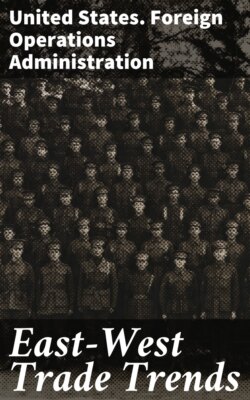Читать книгу East-West Trade Trends - United States. Foreign Operations Administration - Страница 5
На сайте Литреса книга снята с продажи.
Emphasis on Heavy Industry
ОглавлениеTable of Contents
The basic cause of these continual disappointments now is widely understood: The Communist elite, while preaching continually about the “uneven development of capitalism” and the “ever-increasing decomposition of the world economic system of capitalism,” created a remarkably lopsided economy of their own, in comparison with which the free economies of the West look very well-balanced indeed.
Beginning in the 1920’s the Bolsheviks deliberately concentrated on building a base of heavy industry. In their 5-year plans, pig iron, steel, coal, oil, electric power, factories, heavy machinery, armaments have always been given the right of way over the needs of the people for meat, fish, vegetables, vegetable oils, milk, butter, chairs, tables, beds, bicycles, watches and clocks, radio sets, decent homes, boots and shoes, fabrics of cotton, wool, and silk—and so on through the myriads of consumer items that are commonplace in most Western countries.
Impressive advances have been made in heavy industry. But this was done at a staggering cost to the inhabitants. It was accomplished through a vast use of forced labor and police discipline, and through the neglect of the manufacturing of consumer articles, the growing of foodstuffs and textile fibers, and the building of homes and retail stores.
The Kremlin made strenuous efforts to maintain the flow of farm products to the cities, even while drawing labor away from the farms. But heavy metalworking industry was always considered more important than food and clothing. And more important, too, was the long, bitter and as yet unsuccessful attempt to cram collectivism down the throat of the Russian farmer. Stalin considered this struggle ideologically essential. Moreover, it was the means of forcing the peasants to supply food and raw materials to the growing industrial complex without receiving consumer goods in return. All in all, the failure of Soviet farm policy was one of the most resounding failures in the brief history of the U.S.S.R.—and it still is. Bread and potatoes are the principal diet of the masses, and even the grain and potato crops are unsatisfactory.
During the years of Hitler’s devastating invasion, the Kremlin had to dedicate the energies of Soviet Russia to a fight for survival. But when the Grand Alliance crushed Hitler, and the western nations, hoping for a peaceful world under the United Nations, practically dismantled their military establishments and fell back into their normal roles as consumption economies, the Kremlin did not alter the lopsided war economy of the Soviet setup. The Stalin regime inaugurated a new phase of hostility toward the West. The grim drive to build up an industrial-military foundation continued. Consumer goods were still given a low priority in the scheme of things. And all this was discouraging not only to prospects of world peace but also to the prospects of happiness and dignity for the weary and heroic Soviet peoples.
